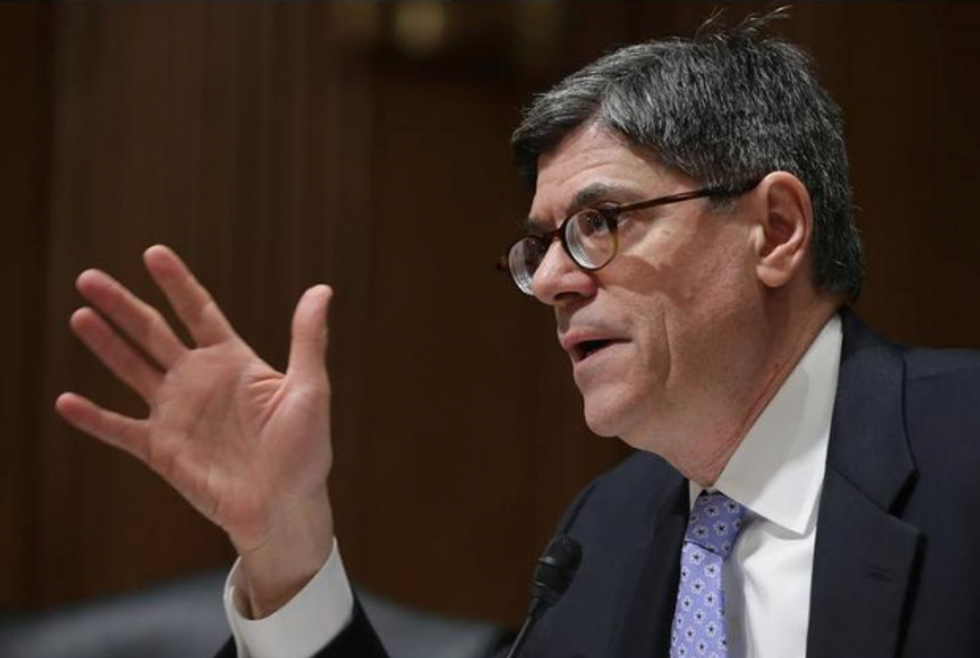
© 2025 Blaze Media LLC. All rights reserved.
Here we go again: Treasury just told Congress the debt ceiling will be hit in 10 days
March 06, 2015
Treasury Secretary Jacob Lew warned Congress Friday that the federal government will once again bump up against the debt ceiling later this month, and once again asked members to raise the debt ceiling.
"Beginning on Monday, March 16, the outstanding debt of the United States will be at the statutory limit," Lew wrote to House and Senate leaders. "Accordingly, I respectfully ask Congress to raise the debt limit as soon as possible."

Lew's short letter will start the latest agonizing process in which Congress will again have to grapple with the exploding national debt. In past years, fights over the debt ceiling have seen Democrats fight for a simple increase, conservative Republicans fight for sharp spending cuts to avoid further debt, and congressional leaders struggle to stitch the two sides together.
A year ago, Congress decided to punt the issue to this year. In February 2014, Congress approved legislation to suspend the debt ceiling altogether, which allowed the government to take on any new debt it needed to fund federal operations.
In that last year, the national debt rose from about $17.4 trillion to $18.1 trillion. The suspension of the debt ceiling ends on March 15, and after that, the legal debt ceiling will be whatever the national debt is at that moment.
Despite the immediacy of the problem, the Treasury Department has been able to use "extraordinary measures" to stay under the ceiling. Lew noted as one example that starting a week from today, Treasury would not longer issue certain securities to states and municipalities, since those count against the national debt.
The debt ceiling debate gives conservatives another chance to cut spending. They've had some success in winning cuts — the "sequester" cuts to the federal government from a few years ago were the result of a fight over how to raise the debt ceiling.
But it's not clear how much stomach House GOP leaders will have for pushing for those kind of cuts again. Most Republicans and Democrats ended up hating the sequester, since it forced cuts to programs that they supported, either on the defense side for Republicans or the social spending side for Democrats.
GOP leaders in the House and Senate haven't indicated how they would proceed, although it's been known for a year that another debt ceiling crisis would emerge this year. And many have pointed to the difficulties in passing a Department of Homeland Security spending bill as a sign that the debt ceiling fight will be incredibly difficult to resolve.
In the meantime, Democrats are expected to renew their argument that raising the debt ceiling doesn't mean any new spending, and instead lets the government pay for the things Congress has already "bought." Lew made this point in his letter:
"It simply allows the government to pay for expenditures Congress has already approved, thereby protecting the full faith and credit of the United States," he wrote.
But with the national debt headed toward $18.2 trillion, Republicans are expected to keep rejecting that argument as one that on enables the government to take on more debt.
Read Lew's letter here:
Want to leave a tip?
We answer to you. Help keep our content free of advertisers and big tech censorship by leaving a tip today.
Want to join the conversation?
Already a subscriber?
more stories
Sign up for the Blaze newsletter
By signing up, you agree to our Privacy Policy and Terms of Use, and agree to receive content that may sometimes include advertisements. You may opt out at any time.
Related Content
© 2025 Blaze Media LLC. All rights reserved.
Get the stories that matter most delivered directly to your inbox.
By signing up, you agree to our Privacy Policy and Terms of Use, and agree to receive content that may sometimes include advertisements. You may opt out at any time.






